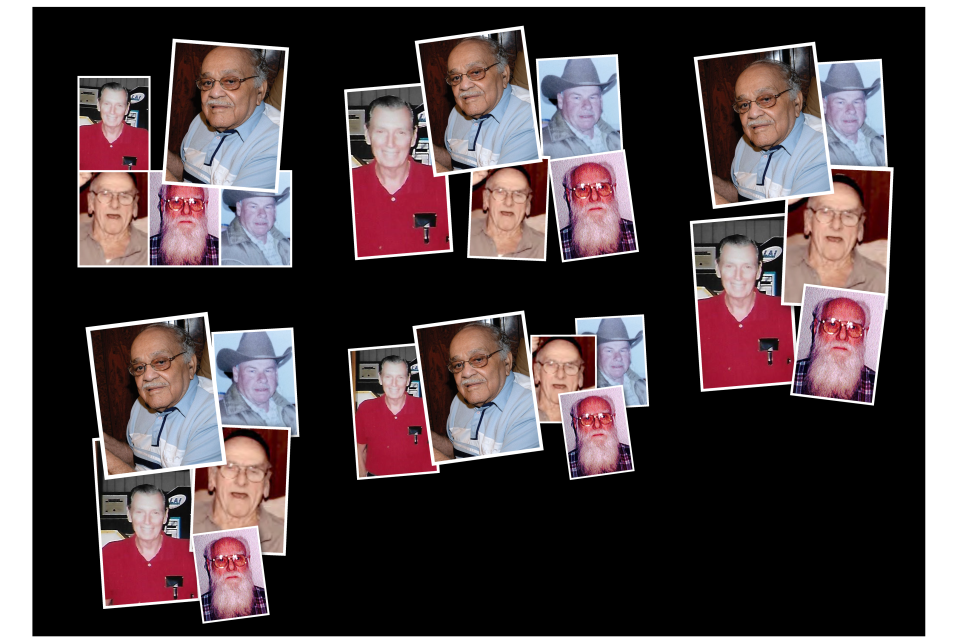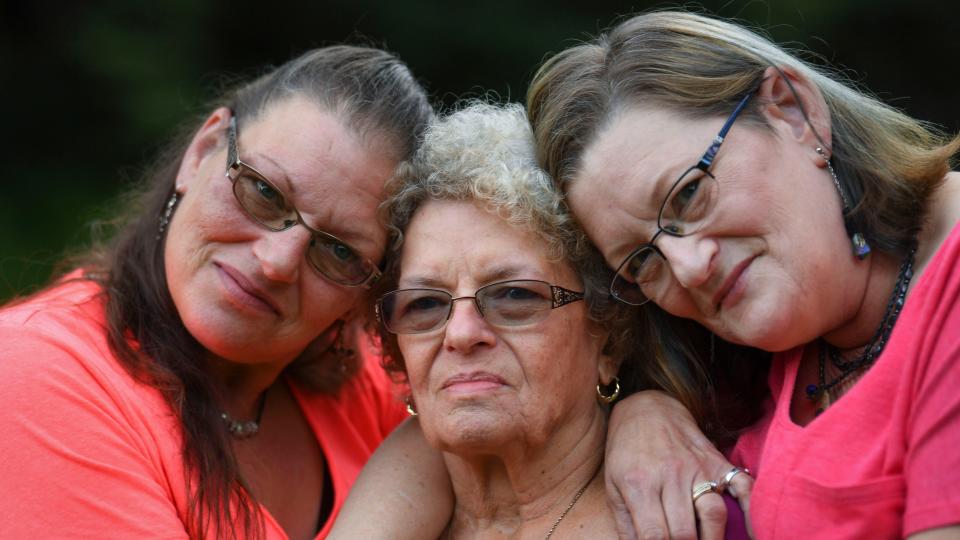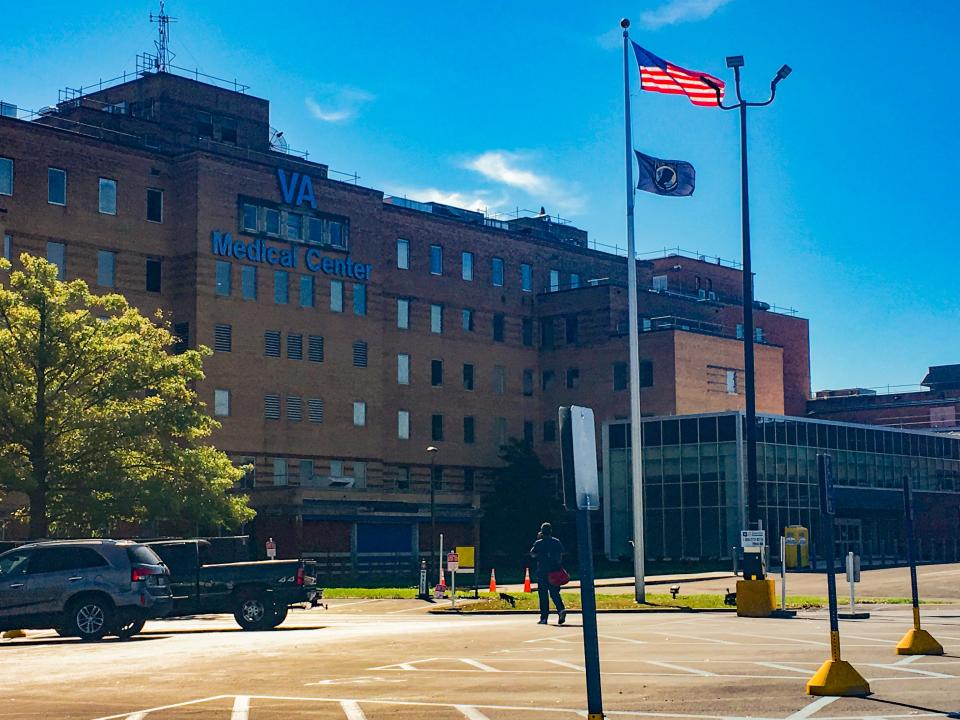'National tragedy': Surveillance, staffing under review after deaths at VA hospital
WASHINGTON – The Department of Veterans Affairs is reviewing how it monitors patient wards, from staffing to video surveillance, amid an ongoing investigation of 10 suspicious patient deaths at a VA hospital in Clarksburg, West Virginia.
Investigators suspect someone injected the men with insulin on the medical-surgical ward of the Louis A. Johnson VA Medical Center from the last half of 2017 through July 2018. Two of the deaths have been classified as homicides.
Based on employee accounts, USA TODAY reported last month that insulin wasn’t adequately tracked and there were no surveillance cameras on the ward. The VA fired a person of interest in the case and federal law enforcement opened an investigation, but so far no one has been charged.
VA Secretary Robert Wilkie said the agency is reviewing staffing levels and whether more can be done to prevent similar incidents. He called the string of deaths a "national tragedy."
"When we come across these things, we treat them as vigorously as we can, and we have been reviewing our protocols, strenuously, and my pledge is that we do everything we can to make it safe," Wilkie said last week at the National Press Club. "We’re reviewing how we monitor wards: Are there cameras there, are there enough cameras? Were the proper checklists in place?"
At the Clarksburg hospital, VA officials last month temporarily removed an associate chief nurse and two nurse managers from the ward where the veterans died, assigning them to other duties for four months, according to staff memos obtained by USA TODAY. The union president at the hospital notified members last week that "there will be several more investigations going on at our facility."

What does the VA hospital say?
Hospital spokesman Wesley Walls referred questions about the personnel moves and investigations to the inspector general’s office, which has declined to provide details about the ongoing investigation.
He said hospital leadership notified authorities immediately upon discovering the serious allegations and put "safeguards in place to ensure the safety of each and every one of our patients."
USA TODAY reported last month that a string of oversights at the hospital risked, and may have cost, veterans’ lives, and limited evidence available to prosecutors seeking to build a criminal case.
Three veterans, including two who were not diabetic, died within three days in April 2018 after unexplained episodes of acute low blood sugar. But the deaths didn’t immediately trigger comprehensive investigations.
By the time hospital officials notified authorities in June 2018, there had been at least eight suspicious deaths, and veterans had been embalmed and buried, destroying potential evidence. In one case, a veteran had been cremated.
Investigation: Red flags missed, limiting evidence in potential serial killer case at VA hospital
What we know: These are the veterans who died at the Clarksburg VA
In the case of 82-year-old Felix "Kirk" McDermott, no autopsy had been performed and there was no indication in medical records reviewed by USA TODAY that doctors ordered key blood tests that could have detected the unprescribed insulin investigators now suspect was coursing through his veins.
A doctor did order those blood tests in another case – that of George Nelson Shaw who died the day after McDermott, on April 10.
Shaw, 81, had been admitted in March after feeling tired and dehydrated. Four days later, on the morning of March 26, his blood sugar crashed, records show.

Between 7:20 a.m. and 8:40 a.m., his blood-sugar ranged from 17 to 30 milligrams per deciliter, less than half the level requiring immediate medical attention. Then, shortly after 9 a.m., blood tests for insulin and a key protein showed both within normal range, records show.
Specialists say timing can be critical for such measures, which should be done when blood sugar is low. By the time of Shaw’s tests, his had rebounded.
Gregory Jones, a consulting physician in diabetes and endocrinology at a Gartnavel General Hospital in Glasgow, Scotland, said "normal" ranges in lab results don’t necessarily apply to patients having episodes of acute low blood sugar.
"Normal ranges are for normal circumstances," he said.
Investigators exhumed veterans' remains
Authorities exhumed the bodies of Shaw and McDermott months later, and autopsies concluded both had been killed by insulin injection. An Armed Forces medical examiner at Dover Air Force Base found four injection sites on Shaw’s body that tested positive for insulin – two on his left arm, one on his right and another on his right thigh, according to the autopsy report. The examiner found one injection site on McDermott’s left abdomen.
Both deaths were ruled homicides.
In two other cases, the medical examiner concluded the deaths were "strongly suspicious" for insulin injection but the causes were undetermined. William Alfred Holloway, 96, died April 8 after experiencing a prolonged episode of acute low blood sugar over 30 hours. Archie Edgell, 84, died March 26 – the same morning Shaw had his bout of low blood sugar. Both men were diabetic.
In a fifth case, John Hallman, 87, was cremated after he died June 13, so an autopsy was impossible afterward. The identities of the other veterans have not been made public.
Five days after Hallman’s death, a group of doctors raised concerns about the unexplained low blood sugar episodes with patient safety staff at the hospital, according to a timeline released by Sen. Joe Manchin, D-W.V. They notified hospital director Glenn Snider a week later. He called headquarters in Washington, which tipped off the VA inspector general’s office.
Nurses who kill:: Clarksburg VA deaths raise questions about past medical murders
Inspector General Michael Missal has said his office is working with the FBI and prosecutors at the Department of Justice to investigate potential wrongdoing resulting in the Clarksburg patient deaths.
"The FBI and the Department of Veteran’s Affairs Office of Inspector General are continuing their investigation, and it has the highest priority," Bill Powell, the U.S. attorney for the Northern District of West Virginia, said in a statement this week.
Family alleges 'medical negligence'
In the meantime, families of some of the veterans have filed claims against the VA, alleging wrongful death. Dino Colombo, a lawyer representing Edgell’s family, said medical providers should have done more when the veteran’s blood sugar dropped.
"It is a case of medical negligence," Colombo said.
Shaw’s widow said she wants to see improvements made so what happened to her husband of nearly 59 years doesn’t happen to another veteran.
"That’s the one thing that we’re after," Norma Shaw said.

Walls, the hospital spokesman, said "Our hearts go out to the families affected by these tragic deaths." He said the hospital has been rated among the best VA health care facilities and the tragedy was an isolated incident.
Since the deaths last year, the Clarksburg VA has tightened the control of insulin on hospital wards. A policy updated in September requires that two people be present when insulin is retrieved from locked medication cabinets. Another issued in April said nursing staff would be issued six-digit PIN codes to access medication in carts, according to copies of internal policies obtained by USA TODAY.
Wilkie, the VA secretary, said that while the agency is reviewing whether more safeguards should be implemented, VA hospitals are "not immune" to problems that happen at other hospitals, including crime. He referenced a case in Ohio where a doctor was charged earlier this year with killing 25 patients by prescribing fatal amounts of fentanyl, for instance. That doctor has pleaded not guilty.
Still, Wilkie said, "Clarksburg is a national tragedy, there’s no two ways about it."
This article originally appeared on USA TODAY: VA hospital surveillance under review in potential serial killer case

